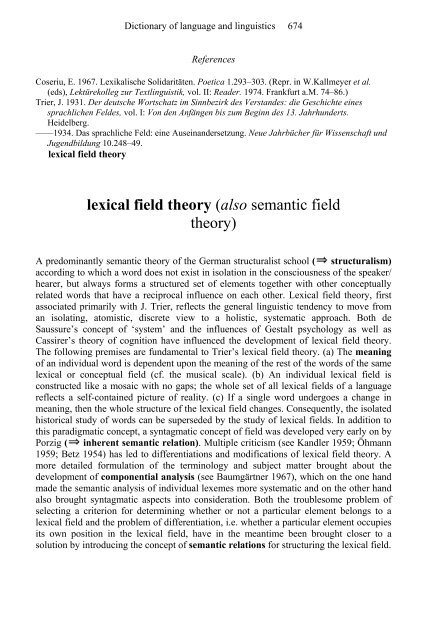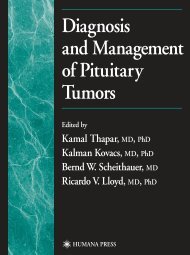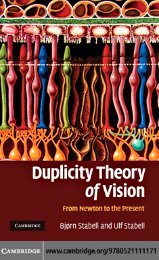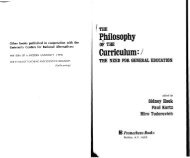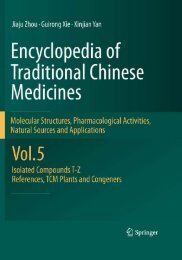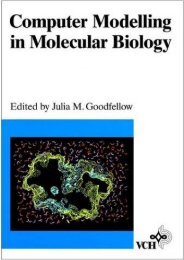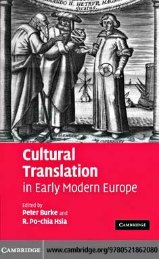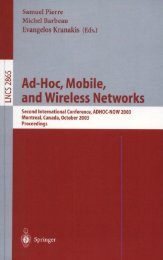- Page 2 and 3:
Dictionary of Language andLinguisti
- Page 4 and 5:
The dictionary is based on: Hadumod
- Page 7 and 8:
PrefaceTwenty-five years ago, when
- Page 9 and 10:
cross-references, updating the bibl
- Page 11 and 12:
Pertinent publications: Deutsch als
- Page 13 and 14:
Professor of Romance Linguistics; U
- Page 15 and 16:
Talbot J.Taylor, Ph.D.Professor of
- Page 17 and 18:
User instructionsBasic structure of
- Page 19 and 20:
List of symbols used in the bookLin
- Page 21 and 22:
ε element relation ‘is an elemen
- Page 24 and 25:
List of abbreviations in the textAD
- Page 26 and 27:
Prep., PPpres.reg.Ssg.st.subj.Vprep
- Page 28 and 29:
COLINGCPsyCScCTLDaFDAIDPrDRLAVDSpEL
- Page 30 and 31:
MPhMRCDMSSNkuNL<NLHNLingNRunOcLPA
- Page 32 and 33:
AAbazaNorth-West Caucasianabbreviat
- Page 34 and 35:
A-Z 3ablative absoluteSyntactic con
- Page 36 and 37:
A-Z 5absolute antonymyGood vs bad,
- Page 38 and 39:
A-Z 7ReferencesFujimura, O. (ed.) 1
- Page 40 and 41:
A-Z 9Morphological case in nominati
- Page 42 and 43:
A-Z 11acoustic analysisGenerally, t
- Page 44 and 45:
A-Z 13acrolectTerm introduced by Bi
- Page 46 and 47:
A-Z 15the coding of intransitive cl
- Page 48 and 49:
A-Z 17(‘x comes before y’); in
- Page 50 and 51:
A-Z 19(Merritt 1976:333)Additional
- Page 52 and 53:
A-Z 21Referencesadjectiveadjunct [L
- Page 54 and 55:
A-Z 23adverbs. In English, there ar
- Page 56 and 57:
A-Z 25affiliation [MLat. affiliare
- Page 58 and 59:
A-Z 27Referencessound changeAfrican
- Page 60 and 61:
A-Z 29underlying ergative system, v
- Page 62 and 63:
A-Z 31agnosia [Grk agnōsía ‘ign
- Page 64 and 65:
A-Z 33occurs within a sentence or i
- Page 66 and 67:
A-Z 35AkanKwaAkkadianOldest atteste
- Page 68 and 69:
A-Z 37——1991. Albanian. In J.Gv
- Page 70 and 71:
A-Z 39The related language Yurok de
- Page 72 and 73:
A-Z 41allegation [Lat. allegare ‘
- Page 74 and 75:
A-Z 43and ‹A› can all be viewed
- Page 76 and 77:
A-Z 45alpha privativum [Lat. privat
- Page 78 and 79:
A-Z 47writingAlseaPenutianAltaicLan
- Page 80 and 81:
A-Z 49alveolo-palatallamino-palatal
- Page 82 and 83:
A-Z 51American EnglishEnglishAmeric
- Page 84 and 85:
A-Z 53ReferencesHartmann, J. 1980.
- Page 86 and 87:
A-Z 55analogue communicationTerm co
- Page 88 and 89:
A-Z 57BibliographyAnttila, R. and W
- Page 90 and 91:
A-Z 59Fox, B.A. 1993. Discourse str
- Page 92 and 93:
A-Z 61Referencesfigure of speechAna
- Page 94 and 95:
A-Z 63Furthermore, animals cannot c
- Page 96 and 97:
A-Z 65Groenendijk, J. and M.Stokhof
- Page 98 and 99:
A-Z 67the patient is marked by an o
- Page 100 and 101:
A-Z 69A-over-A principleA universal
- Page 102 and 103:
A-Z 71Wulfeck, B. et al. 1986. Sent
- Page 104 and 105:
A-Z 73apico-dentalSpeech sound clas
- Page 106 and 107:
A-Z 75apostrophe [Grk ‘a turning
- Page 108 and 109:
A-Z 77applicativeVerbal voice which
- Page 110 and 111:
A-Z 79central ( compact vs diffuse)
- Page 112 and 113:
A-Z 81Prochazka, T. 1988. Saudi Ara
- Page 114 and 115:
A-Z 83arbitrarinessBasic property o
- Page 116 and 117:
A-Z 85Arc Pair Grammarrelational gr
- Page 118 and 119:
A-Z 87argument positionN.Chomsky’
- Page 120 and 121:
A-Z 89GrammarsHübschmann, H. 1897.
- Page 122 and 123:
A-Z 91Depending on the manner in wh
- Page 124 and 125:
A-Z 93articulator (also articulator
- Page 126 and 127:
A-Z 95Johnson-Laird, P. 1988. The c
- Page 128 and 129:
A-Z 97In English, most verbs have a
- Page 130 and 131:
A-Z 99Referencesphoneticsaspiration
- Page 132 and 133:
A-Z 101associationIn psychology, pr
- Page 134 and 135:
A-Z 103athematic verbstem vowelATN
- Page 136 and 137:
A-Z 105audio-lingual method [Lat. a
- Page 138 and 139:
A-Z 107augmented transition network
- Page 140 and 141:
A-Z 109AustroasianAustro-AsiaticAus
- Page 142 and 143:
A-Z 111Journal of Autism and Develo
- Page 144 and 145:
A-Z 113AUXauxiliaryauxiliary [Lat.
- Page 146 and 147:
A-Z 115axiomatics of linguisticsBas
- Page 148 and 149:
A-Z 117back formationIn word format
- Page 150 and 151:
A-Z 119Balto-FinnishFinno-UgricBamb
- Page 152 and 153:
A-Z 121ReferencesChomsky, N. 1986.
- Page 154 and 155:
A-Z 123ReferencesCarter, R. 1987. I
- Page 156 and 157:
A-Z 125are placed close together. (
- Page 158 and 159:
A-Z 127Historical grammarJankoŭski
- Page 160 and 161:
A-Z 129Chaker, S. 1984. Textes en l
- Page 162 and 163:
A-Z 131Meisel, J. (ed.) 1990. Two f
- Page 164 and 165:
A-Z 133reference is bound by a prec
- Page 166 and 167:
A-Z 135possibilities as to which si
- Page 168 and 169:
A-Z 137Black English vernacularBlac
- Page 170 and 171:
A-Z 139borrowingAdoption of a lingu
- Page 172 and 173:
A-Z 141Referencesconstraints, trans
- Page 174 and 175:
A-Z 143Referencesfigure of speechbr
- Page 176 and 177:
A-Z 145ReferencesGrimm, J. 1848. Ge
- Page 178 and 179:
A-Z 147ReferencesBates, E. et al. 1
- Page 180 and 181:
A-Z 149Characteristics: tonal langu
- Page 182 and 183:
A-Z 151calculusDeductive system of
- Page 184 and 185:
A-Z 153CantoneseChinesecapital vs s
- Page 186 and 187:
A-Z 155Koehn, E. and S.Koehn. 1986.
- Page 188 and 189:
A-Z 157case grammar (also case theo
- Page 190 and 191:
A-Z 159Starosta, S. 1978. The one p
- Page 192 and 193:
A-Z 161Referencesfigure of speechCa
- Page 194 and 195:
A-Z 163catchword1 A much-used word
- Page 196 and 197:
A-Z 165types standing in the closes
- Page 198 and 199:
A-Z 167category symbolIn transforma
- Page 200 and 201:
A-Z 169c-commandAn abbreviation for
- Page 202 and 203:
A-Z 171McCone, K.R. 1992. Relative
- Page 204 and 205:
A-Z 173maintained the following: Th
- Page 206 and 207:
A-Z 175Referencescategorial grammar
- Page 208 and 209:
A-Z 177ReferenceJakobson, R. et al.
- Page 210 and 211:
A-Z 179widely spoken language in th
- Page 212 and 213:
A-Z 181Referencestransformational g
- Page 214 and 215:
A-Z 183class nouncommon nounclassic
- Page 216 and 217:
A-Z 185classifierParticle used to c
- Page 218 and 219:
A-Z 187derives the cleft sentence f
- Page 220 and 221:
A-Z 189Referencesfigure of speechcl
- Page 222 and 223:
A-Z 191clusterIn Weinreich’s sema
- Page 224 and 225:
A-Z 193co-constituentConstituents w
- Page 226 and 227:
A-Z 195——1993b. Duelling langua
- Page 228 and 229:
A-Z 197cognitive linguistics (also
- Page 230 and 231:
A-Z 199cohesionCohesion refers to t
- Page 232 and 233:
A-Z 201ReferencesCoseriu, E. 1967.
- Page 234 and 235:
A-Z 203ReferencesBerlin, B., E.A.Be
- Page 236 and 237:
A-Z 205common noun (also class noun
- Page 238 and 239:
A-Z 207transmission of information
- Page 240 and 241:
A-Z 209ReferencesglossematicsCOMP p
- Page 242 and 243:
A-Z 211Grimm, J. 1819-37. Deutsche
- Page 244 and 245:
A-Z 213ReferencesChomsky, N. 1965.
- Page 246 and 247:
A-Z 215complementary distributionCo
- Page 248 and 249:
A-Z 217Chomsky, N. 1970. Remarks on
- Page 250 and 251:
A-Z 219componential analysis (also
- Page 252 and 253:
A-Z 221Van Eynde, F. 1981. Some def
- Page 254 and 255:
A-Z 223occurrence is rule-governed,
- Page 256 and 257:
A-Z 225Cohen, R. 1986. Survey of co
- Page 258 and 259:
A-Z 227still will not result in the
- Page 260 and 261:
A-Z 229conditional implicationimpli
- Page 262 and 263:
A-Z 231Conjugational patterns diffe
- Page 264 and 265:
A-Z 233connecting vowellinking vowe
- Page 266 and 267:
A-Z 235Referencesconnection2 Logica
- Page 268 and 269:
A-Z 237consonant [Lat. consonare
- Page 270 and 271:
A-Z 239constellation [Lat. constell
- Page 272 and 273:
A-Z 241ReferencesSearle, J.R. 1969.
- Page 274 and 275:
A-Z 243Referencesmeaningcontent ana
- Page 276 and 277:
A-Z 245content planeexpression plan
- Page 278 and 279:
A-Z 247contextual implicationimplic
- Page 280 and 281:
A-Z 249continuousprogressivecontoid
- Page 282 and 283:
A-Z 251source of knowledge of a lea
- Page 284 and 285:
A-Z 253ReferencesLewis, D. 1969. Co
- Page 286 and 287:
A-Z 255underlying corresponding syn
- Page 288 and 289:
A-Z 257BibliographyWiese, B. 1980.
- Page 290 and 291:
A-Z 259core vocabularybasic vocabul
- Page 292 and 293:
A-Z 261Referencesphonetics, phonolo
- Page 294 and 295:
A-Z 263ReferencesCruse, D.A. 1986.
- Page 296 and 297:
A-Z 265Hancock, I. 1987. History of
- Page 298 and 299:
A-Z 267cross-referenceanaphoraCross
- Page 300 and 301:
A-Z 269Ehret, C. 1980. The historic
- Page 302 and 303:
A-Z 271DDaco-RumanianRumanianDagest
- Page 304 and 305:
A-Z 273dative [Lat. datum ‘given
- Page 306 and 307:
A-Z 275dativizationdative shiftdaug
- Page 308 and 309:
A-Z 277declarative sentenceSentence
- Page 310 and 311:
A-Z 279deep structure (also underly
- Page 312 and 313:
A-Z 281deficit theorycode theorydef
- Page 314 and 315:
A-Z 283ReferencesChesterman, A. 199
- Page 316 and 317:
A-Z 285deglutinationaphesisdegree (
- Page 318 and 319:
A-Z 287Innis, R.E. (trans.) 1982. K
- Page 320 and 321:
A-Z 289Referencesword formationdeno
- Page 322 and 323:
A-Z 291BibliographyPetöfi, J.S. (e
- Page 324 and 325:
A-Z 293Schachter, P. 1980. Daughter
- Page 326 and 327:
A-Z 295ReferencesAlsina, A. and S.M
- Page 328 and 329:
A-Z 297descriptivityTendency in som
- Page 330 and 331:
A-Z 299pronouns. The precise defini
- Page 332 and 333:
A-Z 301developmental apraxiaapraxia
- Page 334 and 335:
A-Z 303Lahey, M. 1988. Language dis
- Page 336 and 337:
A-Z 305diachronyA term introduced b
- Page 338 and 339:
A-Z 307dialect [Grk diálektos ‘c
- Page 340 and 341:
A-Z 309ReferencesDavis, A.L. 1949.
- Page 342 and 343:
A-Z 311dialect as a ‘restricted c
- Page 344 and 345:
A-Z 313ReferenceMarkey, T.L. 1976.
- Page 346 and 347:
A-Z 315Kremnitz, G. 1987. Diglossie
- Page 348 and 349:
A-Z 317Vennemann, T. 1972. Phonetic
- Page 350 and 351:
A-Z 319directive1 A speech act whos
- Page 352 and 353:
A-Z 321McCarthy, M. and R.Carter. 1
- Page 354 and 355:
A-Z 323BibliographyLohmann, P. 1988
- Page 356 and 357:
A-Z 325ReferenceSeuren, P.A.M. 1985
- Page 358 and 359:
A-Z 327disjunctive feature structur
- Page 360 and 361:
A-Z 329dissimilation of aspiratesla
- Page 362 and 363:
A-Z 331ReferenceKatz, J.J. and J.A.
- Page 364 and 365:
A-Z 333——1964b. Limitations of
- Page 366 and 367:
A-Z 335domain extensionA concept de
- Page 368 and 369:
A-Z 337double-bind theoryTerm intro
- Page 370 and 371:
A-Z 339Characteristics: strongly ag
- Page 372 and 373:
A-Z 341DRS (discourse representatio
- Page 374 and 375:
A-Z 343ReferencesaspectDutchGermani
- Page 376 and 377:
A-Z 345dysfluency (also stammering,
- Page 378 and 379:
A-Z 347dysphasia developmental apha
- Page 380 and 381:
A-Z 349Referencesinterrogativeechol
- Page 382 and 383:
A-Z 351case, case grammar, semantic
- Page 384 and 385:
A-Z 353GrammarsBrunner. H. 1967. Ad
- Page 386 and 387:
A-Z 355elective mutismmutismelement
- Page 388 and 389:
A-Z 357elliptic formIn word formati
- Page 390 and 391:
A-Z 359Referencesfigure of speechem
- Page 392 and 393:
A-Z 361ReferencesGovernment and Bin
- Page 394 and 395:
A-Z 363encoding1 In information the
- Page 396 and 397:
A-Z 365ReferencesmodalityEngaPapuan
- Page 398 and 399:
A-Z 367Historical grammarsBrunner,
- Page 400 and 401:
A-Z 369entailmentimplicationenthyme
- Page 402 and 403:
A-Z 371epiphora [Grk epiphorá ‘b
- Page 404 and 405:
A-Z 373Equatorial languagesLanguage
- Page 406 and 407:
A-Z 375Referenceslevels of adequacy
- Page 408 and 409:
A-Z 377ReferencesComrie, B. 1978. E
- Page 410 and 411:
A-Z 379BibliographySpillner, B. 199
- Page 412 and 413:
A-Z 381EstonianFinno-Ugric language
- Page 414 and 415:
A-Z 383ethnolinguistics (also neo-H
- Page 416 and 417:
A-Z 385EtruscanAncient language of
- Page 418 and 419:
A-Z 387GreekChantraine, P. 1968-80.
- Page 420 and 421:
A-Z 389Decsy, G. 1973. Die linguist
- Page 422 and 423:
A-Z 391exceptional case marking (ab
- Page 424 and 425:
A-Z 393existential causativeeffecte
- Page 426 and 427:
A-Z 395experiencercase grammarexper
- Page 428 and 429:
A-Z 397expression plane vs content
- Page 430 and 431:
A-Z 399ReferenceAsher, N. 1985. The
- Page 432 and 433:
A-Z 401extrinsic vs intrinsic order
- Page 434 and 435:
A-Z 403ReferenceFillmore, C. 1968.
- Page 436 and 437:
A-Z 405ReferencesKuspert, K.C. 1988
- Page 438 and 439:
A-Z 407feature complexfeature bundl
- Page 440 and 441:
A-Z 409field workMethodological pro
- Page 442 and 443:
A-Z 411the for-to filter. In contra
- Page 444 and 445:
A-Z 413finite verb form [Lat. finit
- Page 446 and 447:
A-Z 415Firthian linguistics (also c
- Page 448 and 449:
A-Z 417Referencesmorphologyfluent a
- Page 450 and 451:
A-Z 419Foreign Language Across the
- Page 452 and 453:
A-Z 421Referencesborrowing, languag
- Page 454 and 455:
A-Z 423Language typeAutomata typere
- Page 456 and 457:
A-Z 425ReferencesChomsky, N. and G.
- Page 458 and 459:
A-Z 427Referencesphoneticsfossiliza
- Page 460 and 461:
A-Z 429frame constructionbrace cons
- Page 462 and 463:
A-Z 431Fregean principle principle
- Page 464 and 465:
A-Z 433Historical dictionariesBloch
- Page 466 and 467:
A-Z 435Sino-Tibetan language of Han
- Page 468 and 469:
A-Z 437FulaniFulafunction (also map
- Page 470 and 471:
A-Z 439functional compositionMechan
- Page 472 and 473:
A-Z 441Nuyts, J. et al. (eds) 1990.
- Page 474 and 475:
A-Z 443Functional Unification Gramm
- Page 476 and 477:
A-Z 445functorlogical connectiveFur
- Page 478 and 479:
A-Z 447GGaelic (also Goidelic)Branc
- Page 480 and 481:
A-Z 449ReferencesCarlson, L. 1983.
- Page 482 and 483:
A-Z 451geminate [Lat. geminata ‘d
- Page 484 and 485:
A-Z 453ReferencesBaron, D. 1986. Gr
- Page 486 and 487:
A-Z 455rules from other phrase stru
- Page 488 and 489:
A-Z 457Referencestransformational g
- Page 490 and 491:
A-Z 459generic nouncommon noungener
- Page 492 and 493:
A-Z 461genitiveMorphological case f
- Page 494 and 495:
A-Z 463speakers), Liechtenstein, an
- Page 496 and 497:
A-Z 465Historical dictionariesGoebe
- Page 498 and 499:
A-Z 467GermanicMember of the Indo-E
- Page 500 and 501:
A-Z 469Germanic law of spirantsThe
- Page 502 and 503:
A-Z 471Referenceswritingglide1 semi
- Page 504 and 505:
A-Z 473The goal of linguistic analy
- Page 506 and 507:
A-Z 475Referencesphoneticsglottal s
- Page 508 and 509:
A-Z 477ReferencesBergsland, K. and
- Page 510 and 511:
A-Z 479governing categoryA syntacti
- Page 512 and 513:
A-Z 481ReferencesgovernmentGPSGGene
- Page 514 and 515:
A-Z 483simplicity, completeness, ex
- Page 516 and 517:
A-Z 485Heine, B. and U.Claudi. 1986
- Page 518 and 519:
A-Z 487Hopper (1988) see grammatica
- Page 520 and 521:
A-Z 489graph [Grk gráphein ‘to w
- Page 522 and 523:
A-Z 491Grassmann’s law (also diss
- Page 524 and 525:
A-Z 493GrecismAn idiom of the Greek
- Page 526 and 527:
A-Z 495Etymological dictionariesAnd
- Page 528 and 529:
A-Z 497GuaymiChibchan-PaezanGujarat
- Page 530 and 531:
A-Z 499HhabitualVerbal aspect which
- Page 532 and 533:
A-Z 501ReferencesCardona, G. 1968.
- Page 534 and 535:
A-Z 503ReferencePollard, C. 1984. H
- Page 536 and 537:
A-Z 505ReferencesBerman, R. 1978. M
- Page 538 and 539:
A-Z 507heterography [Grk héteros
- Page 540 and 541:
A-Z 509branching; (d) R is asymmetr
- Page 542 and 543:
A-Z 511to the Low German dialects,
- Page 544 and 545:
A-Z 513HiraganaJapaneseHispano-Celt
- Page 546 and 547:
A-Z 515an Indo-European language. H
- Page 548 and 549:
A-Z 517that refer to more complex c
- Page 550 and 551:
A-Z 519homonymy [Grk ónyma (=ónom
- Page 552 and 553:
A-Z 521many languages there are mor
- Page 554 and 555:
A-Z 523Kiefer, F. and K.E. Kiss (ed
- Page 556 and 557:
A-Z 525hypercharacterizationredunda
- Page 558 and 559:
A-Z 527hyperurbanismhypercorrection
- Page 560 and 561:
A-Z 529IIberianBasqueIbero-RomanceR
- Page 562 and 563:
A-Z 531——1983. Iconic and econo
- Page 564 and 565:
A-Z 533idiolect [Grk ídios ‘one
- Page 566 and 567:
A-Z 535Completely idiomatized phras
- Page 568 and 569:
A-Z 537IjoKwaillative (Lat. illatus
- Page 570 and 571:
A-Z 539The elements produced in the
- Page 572 and 573:
A-Z 541keep your mouth shut?, where
- Page 574 and 575:
A-Z 543aspectimpersonal constructio
- Page 576 and 577:
A-Z 545implicational analysis (also
- Page 578 and 579:
A-Z 547only and even (Only Philip i
- Page 580 and 581:
A-Z 549inclusionLogical relation be
- Page 582 and 583:
A-Z 551Incorporation is a widesprea
- Page 584 and 585:
A-Z 553Referencesmodalityindirect i
- Page 586 and 587:
A-Z 555language of India and Pakist
- Page 588 and 589:
A-Z 557Indo-European (abbrev. IE; a
- Page 590 and 591:
A-Z 559Gamkrelidze, T. and V.V.Ivan
- Page 592 and 593:
A-Z 561Pokorny, J. 1948-59. Indoger
- Page 594 and 595:
A-Z 563inference1 Cognitive process
- Page 596 and 597:
A-Z 565in the syntactic function of
- Page 598 and 599:
A-Z 567ReferencesAnderson, S. 1982.
- Page 600 and 601:
A-Z 569investigational agenda of si
- Page 602 and 603:
A-Z 571Fanselow, G. 1988. ‘Word s
- Page 604 and 605:
A-Z 573ReferenceHoffmann, K. 1967.
- Page 606 and 607:
A-Z 575instrumentative (also instru
- Page 608 and 609:
A-Z 577ReferencesCarnap, R. 1947. M
- Page 610 and 611:
A-Z 579intensional reading attribut
- Page 612 and 613:
A-Z 581interdental [Lat. inter ‘b
- Page 614 and 615:
A-Z 583Selinker, L. 1972. Interlang
- Page 616 and 617:
A-Z 585interludesyllableinternal in
- Page 618 and 619:
A-Z 587Referencesprogramming langua
- Page 620 and 621:
A-Z 589characteristics: initial pos
- Page 622 and 623:
A-Z 591intersection setsetinterview
- Page 624 and 625:
A-Z 593intransitivitytransitivityIn
- Page 626 and 627:
A-Z 595(approx. 1000 BC (Gāthās)
- Page 628 and 629:
A-Z 597Sperber, D. et al. 1981. Iro
- Page 630 and 631:
A-Z 599Referenceslinguistic atlasis
- Page 632 and 633:
A-Z 601isotopy [Grk ísos tópos
- Page 634 and 635:
A-Z 603Etymological dictionariesBat
- Page 636 and 637:
A-Z 605ReferencesMønnesland, S. 19
- Page 638 and 639:
A-Z 607Clancy, P. 1993. Japanese/Ko
- Page 640 and 641:
A-Z 609JeLanguage group in central
- Page 642 and 643:
A-Z 611juncture [Lat. iunctura ‘j
- Page 644 and 645:
A-Z 613KKabardNorth-West CaucasianK
- Page 646 and 647:
A-Z 615KatakanaJapaneseKatharévusa
- Page 648 and 649:
A-Z 617erally dying out. The Khoisa
- Page 650 and 651:
A-Z 619KinyarwandaBantuKiowaUto-Azt
- Page 652 and 653:
A-Z 621phonology, Korean resembles
- Page 654 and 655: A-Z 623LL 1 vs L 2L 1 is used in ap
- Page 656 and 657: A-Z 625LADlanguage acquisition devi
- Page 658 and 659: A-Z 627LandsmålNorwegianlangage [F
- Page 660 and 661: A-Z 629language acquisitionUmbrella
- Page 662 and 663: A-Z 631McWhinney, B. and E.Bates. 1
- Page 664 and 665: A-Z 633language and brainStudy of t
- Page 666 and 667: A-Z 635Rudzka-Ostyn, B. (ed.) 1987.
- Page 668 and 669: A-Z 637ReferencesAitchison, J. 1981
- Page 670 and 671: A-Z 639mental lexicon), processes s
- Page 672 and 673: A-Z 641Nelde. P.-H. (ed.) 1980. Spr
- Page 674 and 675: A-Z 643Blanken, G. et al. 1993. Lin
- Page 676 and 677: A-Z 645Brunner, K. 1942. Altenglisc
- Page 678 and 679: A-Z 647language mixingmixed languag
- Page 680 and 681: A-Z 649Fodor, I. and C.Hagège (eds
- Page 682 and 683: A-Z 651BibliographyGazdar, G. 1987.
- Page 684 and 685: A-Z 653language synthesis [Grk sýn
- Page 686 and 687: A-Z 655JournalLanguage Testing.lang
- Page 688 and 689: A-Z 657langue d’ocFrenchlangue d
- Page 690 and 691: A-Z 659in Hittite, h 2 has been ret
- Page 692 and 693: A-Z 661not mean that only one hemis
- Page 694 and 695: A-Z 663Palmer, R.L. 1954. The Latin
- Page 696 and 697: A-Z 665Soikane-Trapāne, M. 1987. L
- Page 698 and 699: A-Z 667Left and right dislocations
- Page 700 and 701: A-Z 669from a ligature of ‹1› a
- Page 702 and 703: A-Z 671its broader sense, ‘lexeme
- Page 706 and 707: A-Z 675ReferencesBaumgärtner, K. 1
- Page 708 and 709: A-Z 677grammatical function of the
- Page 710 and 711: A-Z 679lexical phonologyApproach in
- Page 712 and 713: A-Z 681well as complex words in the
- Page 714 and 715: A-Z 683Hausmann, F.J., P.Reichmann,
- Page 716 and 717: A-Z 685Stowell, T. and E.Wehrli (ed
- Page 718 and 719: A-Z 687linearity1 The relationship
- Page 720 and 721: A-Z 689ReferencesAllen, H.B. 1973-6
- Page 722 and 723: A-Z 691Wittgenstein, L. 1981. Tract
- Page 724 and 725: A-Z 693the description of competenc
- Page 726 and 727: A-Z 695Matthews, P.H. 1993. Grammat
- Page 728 and 729: A-Z 697linking vowel (also connecti
- Page 730 and 731: A-Z 699Sledd, J. 1986. Permanence a
- Page 732 and 733: A-Z 701BibliographyLietuvos TSR bib
- Page 734 and 735: A-Z 703is interpreted as a speciali
- Page 736 and 737: A-Z 705ReferencesGazdar, G. 1979. P
- Page 738 and 739: A-Z 707languages to natural languag
- Page 740 and 741: A-Z 709LogudoreseSardinianLondon sc
- Page 742 and 743: A-Z 711MMabanNilo-SaharanMacedonian
- Page 744 and 745: A-Z 713Marchuk, Y.M. 1989. Machine-
- Page 746 and 747: A-Z 715Macro-SiouanSiouanmacro spee
- Page 748 and 749: A-Z 717MaipuranArawakan(major) cons
- Page 750 and 751: A-Z 719languages with the Cam-Thai
- Page 752 and 753: A-Z 721ManicheanIranianmanner of ac
- Page 754 and 755:
A-Z 723according to Jakobson (1936)
- Page 756 and 757:
A-Z 725present one alone, with no h
- Page 758 and 759:
A-Z 727mass nounNoun which has no n
- Page 760 and 761:
A-Z 729mathematical logicformal log
- Page 762 and 763:
A-Z 731maximal projection of the no
- Page 764 and 765:
A-Z 733objects, characteristics and
- Page 766 and 767:
A-Z 735Wittgenstein, L. 1953. Philo
- Page 768 and 769:
A-Z 737——1971. Where do sentenc
- Page 770 and 771:
A-Z 739react as soon as the relevan
- Page 772 and 773:
A-Z 741mention vs use object langua
- Page 774 and 775:
A-Z 743metalepsisA rhetorical trope
- Page 776 and 777:
A-Z 745Ortony, A. (ed.) 1979. Metap
- Page 778 and 779:
A-Z 747metrical phonologyConcept of
- Page 780 and 781:
A-Z 749MienMiao-Yaomildly context-s
- Page 782 and 783:
A-Z 751ReferencesNorth and Central
- Page 784 and 785:
A-Z 753modal logicSpecial form of a
- Page 786 and 787:
A-Z 755model1 Generally, a (formal)
- Page 788 and 789:
A-Z 757modification [Lat. modificar
- Page 790 and 791:
A-Z 759ReferencesBates, E. et al. 1
- Page 792 and 793:
A-Z 761ReferencesBinnick, R.I. 1981
- Page 794 and 795:
A-Z 763Referencesphonologymonophtho
- Page 796 and 797:
A-Z 765ReferencesCann, R. 1992. For
- Page 798 and 799:
A-Z 767MordvaFinno-Ugricmorph [Grk
- Page 800 and 801:
A-Z 769morphemics1 In the broad sen
- Page 802 and 803:
A-Z 771structuralism (cf. above und
- Page 804 and 805:
A-Z 773phonemic level) into the con
- Page 806 and 807:
A-Z 775motor aphasiaaphasia, Broca
- Page 808 and 809:
A-Z 777Harlech-Jones, B. 1991. You
- Page 810 and 811:
A-Z 779mutation [Lat. mutatio ‘ch
- Page 812 and 813:
A-Z 781NNa-DenéLanguage group in N
- Page 814 and 815:
A-Z 783narrative analysis [Lat. nar
- Page 816 and 817:
A-Z 785nasalizationnasal harmonyNas
- Page 818 and 819:
A-Z 787vocabulary acquisition. The
- Page 820 and 821:
A-Z 789natural methoddirect methodn
- Page 822 and 823:
A-Z 791‘negation’ refers both t
- Page 824 and 825:
A-Z 793K.Verner, A. Leskien, H.Paul
- Page 826 and 827:
A-Z 795neologistic paraphasia neolo
- Page 828 and 829:
A-Z 797Hecaen, H. and J.Dubois. 196
- Page 830 and 831:
A-Z 799ReferenceJespersen, O.P. 193
- Page 832 and 833:
A-Z 801NiloticChari-Nile languagesN
- Page 834 and 835:
A-Z 803nomen appellativumcommon nou
- Page 836 and 837:
A-Z 805ReferencesTimberlake, A. 197
- Page 838 and 839:
A-Z 807non-fluent aphasia aphasia,
- Page 840 and 841:
A-Z 809non-monotonic reasoninglogic
- Page 842 and 843:
A-Z 811JournalJournal of Nonverbal
- Page 844 and 845:
A-Z 813ReferencesDumézil, G. 1932.
- Page 846 and 847:
A-Z 815notion [Lat. notio ‘concep
- Page 848 and 849:
A-Z 817ReferencesAbney, S.P. 1987.
- Page 850 and 851:
A-Z 819Referencessyllable3 nucleus
- Page 852 and 853:
A-Z 821NuoreseSardinianNynorckNorwe
- Page 854 and 855:
A-Z 823Referencessubordinate clause
- Page 856 and 857:
A-Z 825Mordes an (gen.) ‘He accus
- Page 858 and 859:
A-Z 827ReferencesAlibert, L. 1935.
- Page 860 and 861:
A-Z 829off-glideon-glide vs off-gli
- Page 862 and 863:
A-Z 831of the Old High German conso
- Page 864 and 865:
A-Z 833Old SlavicOld Church SlavicO
- Page 866 and 867:
A-Z 835onomasticsScientific investi
- Page 868 and 869:
A-Z 837onsetsyllableonset of voicin
- Page 870 and 871:
A-Z 839overlooked that in these lin
- Page 872 and 873:
A-Z 841considered the smallest unit
- Page 874 and 875:
A-Z 843ReferencesAustin, J.L. 1962.
- Page 876 and 877:
A-Z 845BibliographyHewes, G.W. 1974
- Page 878 and 879:
A-Z 847ReferencesphoneticsOsseteIra
- Page 880 and 881:
A-Z 849PPaezChibchan-PaezanPahlaviI
- Page 882 and 883:
A-Z 851Referencesarticulation disor
- Page 884 and 885:
A-Z 853Bhatia, T. 1988. Panjabi. Lo
- Page 886 and 887:
A-Z 855by the stem and all inflecti
- Page 888 and 889:
A-Z 857paralanguageparalinguistics,
- Page 890 and 891:
A-Z 859assigns forms an unmarked va
- Page 892 and 893:
A-Z 861ReferencesChomsky, N. 1982.
- Page 894 and 895:
A-Z 8632 In word formation, obsolet
- Page 896 and 897:
A-Z 865lack thereof is the cause fo
- Page 898 and 899:
A-Z 867particle [Lat. particula ‘
- Page 900 and 901:
A-Z 869Referencesmiddle voice, voic
- Page 902 and 903:
A-Z 871PATR-IIPATRpattern drillpatt
- Page 904 and 905:
A-Z 873Pennsylvania DutchLanguage v
- Page 906 and 907:
A-Z 875BibliographyGolla, V. (to ap
- Page 908 and 909:
A-Z 877performative analysisHypothe
- Page 910 and 911:
A-Z 879performative verbSemanticall
- Page 912 and 913:
A-Z 881PermicFinno-Ugricpermutation
- Page 914 and 915:
A-Z 883personMorphological category
- Page 916 and 917:
A-Z 885Chase, S. 1954. The power of
- Page 918 and 919:
A-Z 887Referencesapplicational-gene
- Page 920 and 921:
A-Z 889phoneme1 Since the end of th
- Page 922 and 923:
A-Z 891Referencesphonologyphoneme s
- Page 924 and 925:
A-Z 893phonetic actIn J.L.Austin’
- Page 926 and 927:
A-Z 895phoneticsLinguistic subdisci
- Page 928 and 929:
A-Z 897standard pronunciation patte
- Page 930 and 931:
A-Z 8991968, among others). Phonolo
- Page 932 and 933:
A-Z 901Historical phonologyFisiak,
- Page 934 and 935:
A-Z 903phrase structure diagramtree
- Page 936 and 937:
A-Z 905phraseologyidiomaticsPhrygia
- Page 938 and 939:
A-Z 907BibliographyReinecke, J. et
- Page 940 and 941:
A-Z 909place of articulation (also
- Page 942 and 943:
A-Z 911pleonasm [Grk pleonasmós
- Page 944 and 945:
A-Z 913also plural-only nouns (scis
- Page 946 and 947:
A-Z 915PolishWest Slavic language w
- Page 948 and 949:
A-Z 917PolynesianApprox. thirty clo
- Page 950 and 951:
A-Z 919polysyndetonThe use of more
- Page 952 and 953:
A-Z 921ReferencesHockett, C.F. 1947
- Page 954 and 955:
A-Z 923positivedegreepositivismNeog
- Page 956 and 957:
A-Z 925ReferencesphoneticsPost-Bloo
- Page 958 and 959:
A-Z 927sentences they are part of (
- Page 960 and 961:
A-Z 929Phonology’) and supplement
- Page 962 and 963:
A-Z 931being generalized into compl
- Page 964 and 965:
A-Z 933C’s turn is more complex i
- Page 966 and 967:
A-Z 935prepositional object (also o
- Page 968 and 969:
A-Z 937present perfect perfect 2pre
- Page 970 and 971:
A-Z 939Murphy, J., A.Rogers, and R.
- Page 972 and 973:
A-Z 941Referenceshistorical grammar
- Page 974 and 975:
A-Z 943principle of compositionalit
- Page 976 and 977:
A-Z 945principle of expressibilityt
- Page 978 and 979:
A-Z 947Suppes, P. 1972. Probabilist
- Page 980 and 981:
A-Z 949pro-drop parameterThe parame
- Page 982 and 983:
A-Z 951anaphora, reference, textual
- Page 984 and 985:
A-Z 953Grimshaw, Jane. 1990. Argume
- Page 986 and 987:
A-Z 955ReferencesClocksin, W.F. and
- Page 988 and 989:
A-Z 957pronominalizationpersonal pr
- Page 990 and 991:
A-Z 959proportional analogyanalogyp
- Page 992 and 993:
A-Z 961intensional logic) of an ext
- Page 994 and 995:
A-Z 963Referencesrhetoricprothesis
- Page 996 and 997:
A-Z 965newer subdiscipline of commu
- Page 998 and 999:
A-Z 967——1989. Speaking: from i
- Page 1000 and 1001:
A-Z 969Redfern, W. 1984. Puns. Oxfo
- Page 1002 and 1003:
A-Z 971Qq-CelticCelticqualitative a
- Page 1004 and 1005:
A-Z 973structure, in generative sem
- Page 1006 and 1007:
A-Z 975Aymara it is supposed to for
- Page 1008 and 1009:
A-Z 977Rradical [Lat. radix ‘root
- Page 1010 and 1011:
A-Z 979RajasthaniIndo-Aryanrangefun
- Page 1012 and 1013:
A-Z 981Referencestransformational g
- Page 1014 and 1015:
A-Z 983Referencescase grammarrecipi
- Page 1016 and 1017:
A-Z 985Haas, M.R. 1966. Historical
- Page 1018 and 1019:
A-Z 987belongs to the car. The only
- Page 1020 and 1021:
A-Z 989reduplicationDoubling of ini
- Page 1022 and 1023:
A-Z 991Referencesreferencereferenti
- Page 1024 and 1025:
A-Z 993Geniusiene, E. 1988. The typ
- Page 1026 and 1027:
A-Z 995regressive assimilationassim
- Page 1028 and 1029:
A-Z 997assumption of relational gra
- Page 1030 and 1031:
A-Z 999relative adjectiveadjectiver
- Page 1032 and 1033:
A-Z 1001Werth, P. 1985. The concept
- Page 1034 and 1035:
A-Z 1003resonance chamberTerm taken
- Page 1036 and 1037:
A-Z 1005towards the top and back of
- Page 1038 and 1039:
A-Z 1007DictionariesDicziunari Ruma
- Page 1040 and 1041:
A-Z 1009argumentation, figure of sp
- Page 1042 and 1043:
A-Z 1011risingfalling vs risingrisi
- Page 1044 and 1045:
A-Z 1013RomanianRumanianRomanizatio
- Page 1046 and 1047:
A-Z 1015transformations include imp
- Page 1048 and 1049:
A-Z 1017rule inversionTerm in (gene
- Page 1050 and 1051:
A-Z 1019DialectologyAtlasul lingvis
- Page 1052 and 1053:
A-Z 1021DictionariesHarrison, W. an
- Page 1054 and 1055:
A-Z 1023SalishSalishanSalishanLangu
- Page 1056 and 1057:
A-Z 1025SangoAdamawa-UbangiSanskrit
- Page 1058 and 1059:
A-Z 1027SantaliMundaSapir-Whorf hyp
- Page 1060 and 1061:
A-Z 1029Etymological dictionaryWagn
- Page 1062 and 1063:
A-Z 1031schemaGeneralized knowledge
- Page 1064 and 1065:
A-Z 1033scopeIn analogy to formal l
- Page 1066 and 1067:
A-Z 1035‘parameters’ that are r
- Page 1068 and 1069:
A-Z 1037second sound shift Old High
- Page 1070 and 1071:
A-Z 1039segmentationElementary anal
- Page 1072 and 1073:
A-Z 1041ReferenceNoreen, A. 1923. E
- Page 1074 and 1075:
A-Z 1043semantic differentialA proc
- Page 1076 and 1077:
A-Z 1045ReferenceFeather, B.W. 1965
- Page 1078 and 1079:
A-Z 1047restriction, inherent seman
- Page 1080 and 1081:
A-Z 1049ReferencesBarwise, J. and J
- Page 1082 and 1083:
A-Z 1051ReferencesBühler, K. 1934.
- Page 1084 and 1085:
A-Z 1053comprises the study of othe
- Page 1086 and 1087:
A-Z 1055Haarmann, H. 1990. Language
- Page 1088 and 1089:
A-Z 1057Characteristics: a series o
- Page 1090 and 1091:
A-Z 1059sensory aphasia aphasia, We
- Page 1092 and 1093:
A-Z 1061sentence moodGrammatical ca
- Page 1094 and 1095:
A-Z 1063sententialProperty of parti
- Page 1096 and 1097:
A-Z 1065alternately leads to the ex
- Page 1098 and 1099:
A-Z 1067grammaticalized meaning, e.
- Page 1100 and 1101:
A-Z 1069For example: the set of tra
- Page 1102 and 1103:
A-Z 1071set phraseidiomset theoryBa
- Page 1104 and 1105:
A-Z 1073shutteringdysfluencySiamese
- Page 1106 and 1107:
A-Z 1075vs signified). In contrast
- Page 1108 and 1109:
A-Z 1077Bellugi, U. and D.Newkirk.
- Page 1110 and 1111:
A-Z 1079signatumsignifier vs signif
- Page 1112 and 1113:
A-Z 1081singletonsetsingularSubcate
- Page 1114 and 1115:
A-Z 1083Williamson, J.S. 1984. Stud
- Page 1116 and 1117:
A-Z 1085thousand speakers. Old Chur
- Page 1118 and 1119:
A-Z 1087the Latin alphabet with num
- Page 1120 and 1121:
A-Z 1089sociolect (also social dial
- Page 1122 and 1123:
A-Z 1091Black English, English, fem
- Page 1124 and 1125:
A-Z 1093in Czech Brünn (town name)
- Page 1126 and 1127:
A-Z 10952 In the broader sense, gen
- Page 1128 and 1129:
A-Z 1097Referencesphoneticssound im
- Page 1130 and 1131:
A-Z 1099sound symbolism (also phone
- Page 1132 and 1133:
A-Z 1101Loukotka, Č. 1968. Classif
- Page 1134 and 1135:
A-Z 1103BibliographiesBialik Huberm
- Page 1136 and 1137:
A-Z 1105specifiermodifierspectral a
- Page 1138 and 1139:
A-Z 1107Structure of speech actsto
- Page 1140 and 1141:
A-Z 1109Franck, D. 1979. Seven sins
- Page 1142 and 1143:
A-Z 1111above all on semantic relat
- Page 1144 and 1145:
A-Z 1113speech perceptionspeech rec
- Page 1146 and 1147:
A-Z 1115Referencessound changespoke
- Page 1148 and 1149:
A-Z 1117ReferencesSapir-Whorf hypot
- Page 1150 and 1151:
A-Z 1119statal verbstative vs activ
- Page 1152 and 1153:
A-Z 1121steady-state sounds vs tran
- Page 1154 and 1155:
A-Z 1123Eikmeyer, H.-J. and H.Riese
- Page 1156 and 1157:
A-Z 1125story grammarExpansion of t
- Page 1158 and 1159:
A-Z 1127stress1 In the narrow sense
- Page 1160 and 1161:
A-Z 1129strict implicationimplicati
- Page 1162 and 1163:
A-Z 1131structural analysisIn trans
- Page 1164 and 1165:
A-Z 1133signs in the same system. T
- Page 1166 and 1167:
A-Z 1135description. The following
- Page 1168 and 1169:
A-Z 1137context-sensitive rules. (a
- Page 1170 and 1171:
A-Z 1139Keenan, E.L. 1976. Towards
- Page 1172 and 1173:
A-Z 1141ReferenceJames, F. 1986. Se
- Page 1174 and 1175:
A-Z 1143The use of the term ‘subo
- Page 1176 and 1177:
A-Z 1145having the same function in
- Page 1178 and 1179:
A-Z 1147distinction is drawn betwee
- Page 1180 and 1181:
A-Z 1149superlative [Lat. superlati
- Page 1182 and 1183:
A-Z 1151suprasegmental feature (als
- Page 1184 and 1185:
A-Z 1153SvanSouth Caucasiansvarabha
- Page 1186 and 1187:
A-Z 1155syllabaryGenerally, the (or
- Page 1188 and 1189:
A-Z 1157syllepsiszeugmasyllogism [G
- Page 1190 and 1191:
A-Z 1159Term used by K.Bühler to d
- Page 1192 and 1193:
A-Z 1161syncategorematic wordsynsem
- Page 1194 and 1195:
A-Z 1163synecdoche [Grk ‘understa
- Page 1196 and 1197:
A-Z 1165operational definition and
- Page 1198 and 1199:
A-Z 1167ReferencesAbney, S. 1987. T
- Page 1200 and 1201:
A-Z 1169ReferenceLyons, J. 1968. In
- Page 1202 and 1203:
A-Z 1171ReferencesSchlegel, A.W. 18
- Page 1204 and 1205:
A-Z 1173Ttaboo word [Polynesian tab
- Page 1206 and 1207:
A-Z 1175tagmaticsThe investigation
- Page 1208 and 1209:
A-Z 1177Takelma-KalapuyanPenutianTa
- Page 1210 and 1211:
A-Z 1179Tarskian semantics model-th
- Page 1212 and 1213:
A-Z 1181telescoped wordblendtelic v
- Page 1214 and 1215:
A-Z 1183perspective of the speaker.
- Page 1216 and 1217:
A-Z 1185tensed formfinite verb form
- Page 1218 and 1219:
A-Z 1187text [Lat. textus ‘piece
- Page 1220 and 1221:
A-Z 1189Referencesdiscourse grammar
- Page 1222 and 1223:
A-Z 1191ReferencesBeaugrande, R.A.
- Page 1224 and 1225:
A-Z 1193ReferencesSuter, H.-J. 1993
- Page 1226 and 1227:
A-Z 1195Characteristics: tonal lang
- Page 1228 and 1229:
A-Z 1197characteristics. Although e
- Page 1230 and 1231:
A-Z 1199Urdang, L. 1991. Oxford the
- Page 1232 and 1233:
A-Z 1201TigreSemiticTigrinyaGe’ez
- Page 1234 and 1235:
A-Z 1203BibliographiesSchwentner, E
- Page 1236 and 1237:
A-Z 1205Referencesphonetics, tonolo
- Page 1238 and 1239:
A-Z 12072 Analysis of utterances ac
- Page 1240 and 1241:
A-Z 1209ReferencesCresswell, M.J. 1
- Page 1242 and 1243:
A-Z 1211ReferencesChomsky, N. 1973.
- Page 1244 and 1245:
A-Z 1213features of the mother tong
- Page 1246 and 1247:
A-Z 1215transformational cycleA pri
- Page 1248 and 1249:
A-Z 1217——1964b. The logical ba
- Page 1250 and 1251:
A-Z 1219BibliographiesDingwall, W.O
- Page 1252 and 1253:
A-Z 1221transitional competenceinte
- Page 1254 and 1255:
A-Z 1223ReferencesBell, R.T. 1991.
- Page 1256 and 1257:
A-Z 1225transparent context opaque
- Page 1258 and 1259:
A-Z 1227tree-pruning conventionIn t
- Page 1260 and 1261:
A-Z 1229contribution to determining
- Page 1262 and 1263:
A-Z 1231Kripke, S. 1975. Outline of
- Page 1264 and 1265:
A-Z 1233years. The largest language
- Page 1266 and 1267:
A-Z 1235Maynard, D. and S.Clayman.
- Page 1268 and 1269:
A-Z 1237of types’ which was modif
- Page 1270 and 1271:
A-Z 1239ReferencesGrammarsBilodid,
- Page 1272 and 1273:
A-Z 1241transitive verb with its in
- Page 1274 and 1275:
A-Z 1243realized form becomes more
- Page 1276 and 1277:
A-Z 1245signals the inconsistency.
- Page 1278 and 1279:
A-Z 1247unilateral implicationimpli
- Page 1280 and 1281:
A-Z 1249universal grammar1 general
- Page 1282 and 1283:
A-Z 1251Articulatory change (usuall
- Page 1284 and 1285:
A-Z 1253ReferencesComputational Lin
- Page 1286 and 1287:
A-Z 1255uvularSpeech sound classifi
- Page 1288 and 1289:
A-Z 1257In the older literature bas
- Page 1290 and 1291:
A-Z 1259variablevariabilityvariable
- Page 1292 and 1293:
A-Z 1261——1988b. Sociolinguisti
- Page 1294 and 1295:
A-Z 1263VepsFinno-Ugricverb [Lat. v
- Page 1296 and 1297:
A-Z 1265verbal adjectivegerundiveve
- Page 1298 and 1299:
A-Z 1267vibrant (also trill)Speech
- Page 1300 and 1301:
A-Z 1269vocal cords [Lat. vocalis
- Page 1302 and 1303:
A-Z 1271changes, e.g. Everybody lov
- Page 1304 and 1305:
A-Z 1273voicing assimilationassimil
- Page 1306 and 1307:
A-Z 1275*Occurs as first element in
- Page 1308 and 1309:
A-Z 1277vowel gradationablautvowel
- Page 1310 and 1311:
A-Z 1279WappoGulf languagesWarlpiri
- Page 1312 and 1313:
A-Z 1281principle holds only for ce
- Page 1314 and 1315:
A-Z 1283West AtlanticBranch of the
- Page 1316 and 1317:
A-Z 1285wh-wordinterrogative pronou
- Page 1318 and 1319:
A-Z 1287and morphological levels, e
- Page 1320 and 1321:
A-Z 1289formation find their expres
- Page 1322 and 1323:
A-Z 1291refers to preferences perta
- Page 1324 and 1325:
A-Z 1293word stress stress 2word st
- Page 1326 and 1327:
A-Z 1295written language1 Generally
- Page 1328 and 1329:
A-Z 1297ReferencesBresnan, J. 1977.
- Page 1330 and 1331:
A-Z 1299ReferencesFishman, J.A. 196
- Page 1332 and 1333:
A-Z 1301YumanHokanYuorokAlgonquianY
- Page 1334 and 1335:
A-Z 1303zeugma [Grk zeũgma ‘bond


